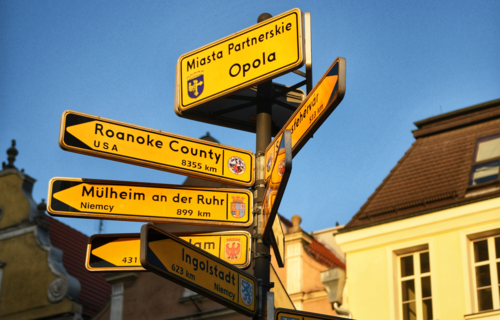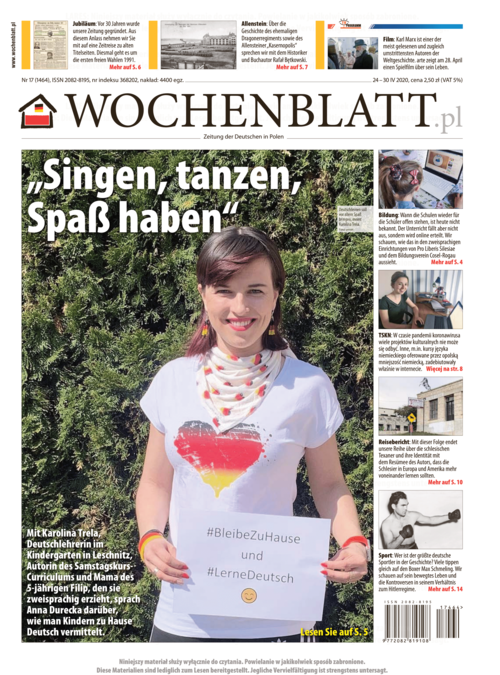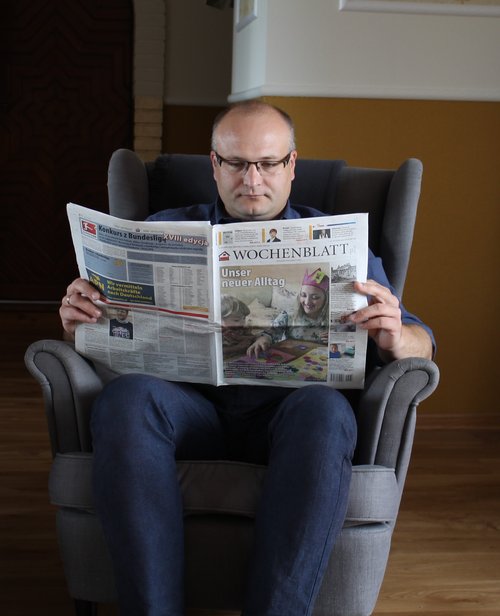Minority language media and the COVID-19 pandemic – the case of German in Poland: An Interview with Rudolf Urban.



A series edited and conceptualised by Dr. Sergiusz Bober and Craig Willis.
Our ninth interview on the effects of the COVID-19 pandemic on minority language media, features an interview with Rudolf Urban outlining the situation for the German minority in Poland. As editor-in-chief of the Wochenblatt.pl weekly newspaper, Rudolf is well-placed to provide insight into the situation in this linguistic sphere which also has radio, TV and a sizeable online presence. This interview highlights the new practices which the newspaper has had to adapt to, as well as outlines how the activities of the German minority had shifted to be mostly online. Although the newspaper sales fell slightly, online readership figures increased, whilst the new online video platform Wochenblatt.TV was also launched during the pandemic. There have been concerning aspects related to fake news and political scapegoating (related to wider political developments) which have troubled the local situation for the minority.
Rudolf begins by detailing the situation of the German minority in Poland and their various media activities.
As an introduction, could you please summarise the minority language media (MLM) situation in your linguistic sphere?
The landscape of German language minority media in Poland consists of several outlets. Among the printed ones, the weekly newspaper Wochenblatt.pl, with a current print run of 4,400 copies, is the largest and most frequently published. It was established 30 years ago in Opole, where its headquarters are still located. It is published by a team of four permanently employed journalists and a few freelancers. Topic-wise, Wochenblatt.pl focuses primarily on the activities of the German minority – cultural, educational, political, and economic. From the very beginning a characteristic feature of the newspaper is its bilingualism. When it was initially introduced, the aim was to reach out towards those members of the German minority in Poland, who were not able to speak German. Currently the reason behind bilingualism has shifted, as it is also aimed at members of the majority population who are interested in the activities of the German minority in Poland.
Other outlets like Masurische Storchenpost or Mitteilungsblatt - are published as monthly magazines; Oberschlesische Stimme, on the other hand, has been published bi-weekly for a number of years as a supplement to Wochenblatt.pl.
All those titles are published by different organizations of the German minority in Poland. When it comes to financing, this is provided by both the Polish and German states, however each publication has different funding proportions. Wochenblatt.pl, for instance, receives one third of its funding from Polish sources, an equal amount from Germany, with the final third needing to be secured through profit on sales and advertising.
In terms of television, the German minority in Poland has only one programme – Schlesien Journal. It is produced by the Association of German Social-Cultural Societies in Poland (VdG - Verband der Deutschen Sozial-Kulturellen Gesellschaften in Polen; the umbrella organization of the German minority) and broadcast on the public channels TVP3 Opole and TVP3 Katowice, as well as by a private satellite channel TVS. It is a bilingual weekly magazine, lasting around 11 minutes. Viewing figures provided by TVS show an average weekly audience of approx. 15,000.
Radio programmes for the German minority and in German language are broadcast by public radio stations in Opole, Katowice, Wrocław, and Olsztyn. In the case of Opole and Katowice, the content is produced by journalists employed by the organizations of the German minority, while in Wroclaw and Olsztyn it is produced by a given radio station – with the German minority being a partner in the framework of this project. Besides the above, in Opole and Raciborz the German minority also produces content for private broadcasters, such as Radio Doxa and Radio Vanessa. Importantly, in those cases the German minority needs to pay for airtime.
Besides printed media, radio and TV programmes, the German minority produces its own internet radio “Mittendrin” as well. It is an initiative of the media team of the German minority from Racibórz (Silesian Voivodeship). Currently the radio operates two channels: “Region”, broadcasting different programmes concerning the German minority, mostly produced for regional public service radio broadcasters; and "Alt!Neu", focusing primarily on younger listeners interested in music and culture of the countries and areas where German language is spoken. Radio “Mittendrin” gives the German minority the possibility to reach an audience which does not usually use traditional media at all.
Recently VdG launched a new web portal www.deutschemedien.pl with the aim of presenting all media of the German minority in Poland. Consequently, this site gives the possibility to listen to radio programmes and radio “Mittendrin”, watch TV programmes and other video productions of the minority media, as well as read press articles in PDF files or their online versions. Of course, at the moment it is difficult to say conclusively to what degree that initiative will contribute to the wider knowledge of the media of German minority both in Poland and abroad.
Besides the above, the German minority is also active online in terms of websites and social media of individual local organizations. Here, the form and content vary between different branches of the minority.
How has the COVID-19 pandemic affected the reporting of the MLM in your area and has there been any effect on readership / viewing figures?
In Wochenblatt.pl, the development of the pandemic has not been covered in detail, mostly because we are published on a weekly basis. In spite of the above, of course we tried to inform our readers about the most important changes concerning public life, from the moment of the initial lockdown’s introduction until its gradual phasing-out in the summer.
At the same time, we tried to focus more closely on issues concerning the closed Polish-German border. Many people in Poland work in Germany, among them also members of the German minority, while economic and cultural links between both countries are very dense. Nevertheless, the pandemic and the closure of borders suspended the free movement of people and goods. Within this thematic field, we covered, for example, the situation of Polish doctors working in Germany, who – because of the closed border – had to stay on the German side in order to avoid quarantine in Poland, or for the same reason were forced not to cross the border in the other direction. Importantly, it created not only difficulties concerning their private and professional lives, but also disrupted the functioning of health-care sector in border regions. Another exemplary topic concerned entrepreneurs from Upper Silesia and their strategies of coping with the economic consequences of the pandemic.
When it comes to our newspaper’s sales figures, it has slightly decreased, but at the same time we were able to see increasing numbers concerning visits to our website and social media accounts.
Unfortunately, we have not received data concerning radio listening figures from respective stations. However, data provided by TVS channel shows that viewing figures of the Schlesien Journal have increased in the first six month of 2020 by approximately 20%.
In spite of the absence of ‘traditional’ activities of the German minority during the time of the pandemic, I am of opinion that radio and television programmes, as well as Wochenblatt.pl did not excessively struggle to fill airtime or newspaper pages. The minority very quickly ‘migrated’ towards the internet with such activities as concerts, competitions, workshops, thus creating content for newspaper and radio coverage. Schlesien Journal, on the other hand, offered a series of programmes covering the history of cities and towns in Upper Silesia.
How has the lockdown / social distancing measures affected other covered content in MLM?
COVID-19 has completely changed the way German minority operate in an organizational sense. Most of the events (meetings, concerts, workshops etc.) had to be either postponed or moved online. Senior members’ clubs and football academies had to suspend their activities, while teaching shifted to an online mode. For Wochenblatt.pl these were developments of primary importance, and we informed our readers in detail how the pandemic has affected organizations of the German minority. Importantly, due to the aforementioned very quick “migration” of many activities to the internet, we were not short of strictly minority-related topics. As a result, we were not forced to cut the number of pages, and throughout that time the newspaper had been published in the usual length of 16 pages.
Importantly, we also reported on members of the German minority who were involved in initiatives addressing the needs of elderly persons during the pandemic, or who voluntarily sewed face masks reducing the risk of infection.
During the lockdown we have been also trying to counter fake news which were widely distributed, also among members of the German minority. These were mostly focused on the ways the virus can be transmitted, and measures introduced or not introduced by the authorities. Since we are a small team, it was beyond our means to contradict all misinformation of that kind. Therefore, from the very beginning, we have decided to provide on our website a very visible link to credible and frequently updated information concerning the pandemic provided by the government.
How has MLM covered issues of majority-minority relations and has the situation or voice of minorities been covered in majority media?
Originally two significant anniversaries were supposed to be celebrated / commemorated in 2020. On the one hand, it is 30 years since the establishment of the German minority’s organizations in Silesia. On the other, VdG planned to draw attention to the sufferings of Germans in Poland in the aftermath of WWII, in relation to the 75th anniversary of its ending. Because of the pandemic, most of the events planned in the context of the first anniversary had to be cancelled, while only some were moved to the internet. The situation was similar when it comes to the events commemorating victims of the post-war years. As a result, in most of the majority media those important topics were basically non-existent. Only on the regional level the majority media, naturally alongside media of the German minority, informed about the minority’s anniversary and initiatives commemorating the victims.
Unfortunately, during the recent months in the Opole voivodeship, the German minority – which constitutes part of a regional governing-coalition, alongside the Civic Coalition (Koalicja Obywatelska) and the Polish People’s Party (PSL) – has been the target of direct and indirect attacks by politicians of the United Right (Zjednoczona Prawica; a governing coalition on a national level in Poland since 2015). It can be argued that in this way an unofficial electoral campaign has begun, three years ahead of the next local and regional elections. Those attacks have been widely commented on in regional media, as well as in some national outlets. Importantly, they were not questioning the minority’s right to live in its homeland or its loyalty towards a host state; instead it was targeted as a purely political enemy, who are an obstacle to take over reigns in the region, with – as it was alleged – a poor record in government.
In what way has the pandemic affected MLM practitioners’ day to day work and have there been any future implications discussed?
The COVID-19 pandemic caused some changes in our editorial day-to-day work. A part of our team switched to home office. This meant in practice that the whole team had to move to remote work and to using internet channels of communication. Especially at the beginning it was a challenge, as before the pandemic it was normal that most of our editorial team was physically present during the final preparations concerning every weekly edition.
Ultimately, we were able to find a simple but efficient way of working remotely. In fact, we continue to use it, and I am convinced that it is going to stay with us for much longer. At the same time, we try to plan the work at our editorial office in such a way that someone is always present, so those of our readers who would like to get in touch with us can do it without any problems.
Indeed, to a certain degree it is justified to be concerned that the pandemic might lead to the reduction of funding we receive from both the German and Polish governments. At the same time, it is too early to say something definite with regard to that.
How has social media in minority language played a role during the pandemic?
For a number of years Wochenblatt.pl has had its own website and Facebook profile. In late 2018 we reactivated our Twitter account as well. In 2020, not exclusively because of the pandemic (although this has contributed to our more energetic efforts), we have initiated the production of video interviews through a platform titled Wochenblatt.TV. This has mostly been in order to make our website and Facebook more attractive, albeit this is currently an irregular feature. Our intention is therefore to turn Wochenblatt.TV into a weekly programme offered on all internet channels at our disposal.
About the author:
Rudolf Urban (1980), German philologist and historian, active for over 20 years in the German minority media in Opole Voivodeship. First employed as a radio journalist, afterwards as head of the “Schlesien Aktuell” editorial team (a programme produced by German minority for Radio Opole). Currently he is the editor-in-chief of Wochenblatt.pl weekly newspaper, and still actively cooperates with teams producing radio and television programmes of the German minority in Opole. Also an active member of the German minority’s local organization in Tarnów Opolski, and the chairperson of the municipal council there.


Commentaries
If you wish to write a commentary on this interview, please contact the editors Dr. Sergiusz Bober and Craig Willis.

